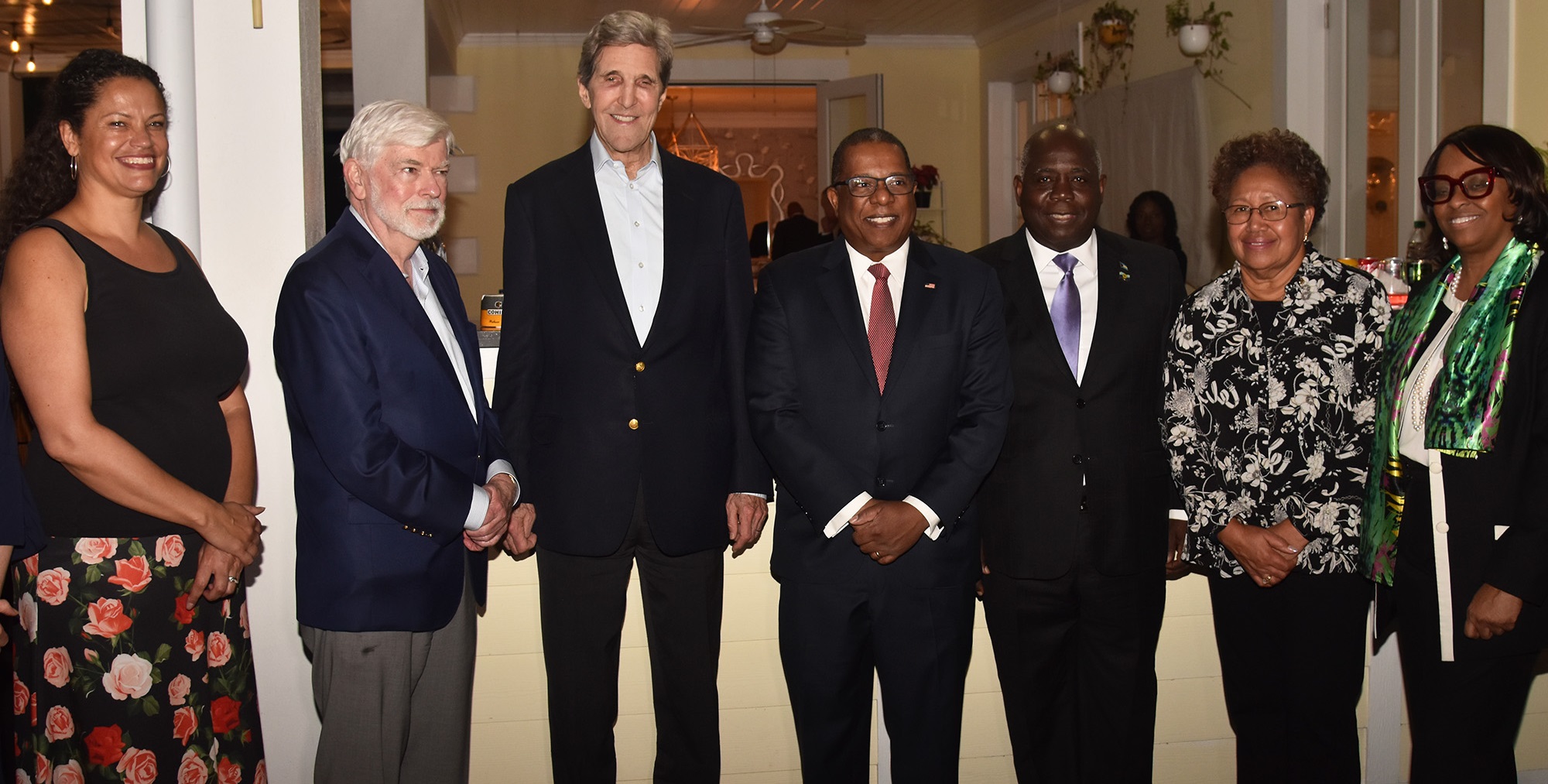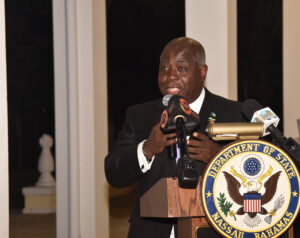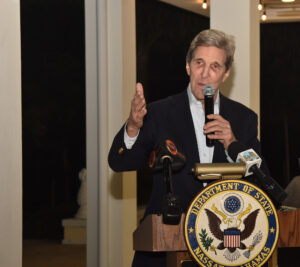Caribbean News
United States Holds US-CARICOM Partnership Reception in Honour of Relationship
Published
3 years agoon

NASSAU, The Bahamas – Ahead of the 44th Regular Meeting of the Heads of Government of CARICOM, officials of the United States Embassy in Nassau held a reception in honour of the leaders of the Caribbean Community.
The U.S. -CARICOM Partnership Reception was held on Valentine’s Day, February 14, 2023 at the U.S. Deputy Chief of Mission’s Residence, and hosted by Charge d’Affaires Usha Pitts.
Present were the Hon. Philip Davis, Prime Minister and Minister of Finance and Chair of CARICOM; Minister of
 Foreign Affairs the Hon. Fred Mitchell; Her Excellency Leslia Miller-Brice, Bahamas High Commissioner to CARICOM; and Dr. Carla Natalie Barnett, Secretary General, CARICOM; the 27-member U.S. Delegation led by Brian Nichols, U.S. Assistant Secretary for Western Hemisphere Affairs; and John Kerry, U.S. Special Presidential Envoy for Climate. Other high level representatives from The Bahamas, the U.S. and CARICOM were also present.
Foreign Affairs the Hon. Fred Mitchell; Her Excellency Leslia Miller-Brice, Bahamas High Commissioner to CARICOM; and Dr. Carla Natalie Barnett, Secretary General, CARICOM; the 27-member U.S. Delegation led by Brian Nichols, U.S. Assistant Secretary for Western Hemisphere Affairs; and John Kerry, U.S. Special Presidential Envoy for Climate. Other high level representatives from The Bahamas, the U.S. and CARICOM were also present.“What a pleasure to be with you all tonight, as we celebrate the time-honoured relationship between the United States and the nations of CARICOM,” said Prime Minister Davis.
He extended heartfelt appreciation to the United States for its ongoing commitment to supporting the nations of CARICOM as member-states build a more secure and prosperous future for its people.
He also specifically thanked Mr. Kerry his “comrade in arms” for his continued support in the fight against Climate Change.
And, in his remarks, Mr. Kerry spoke about continued efforts to advance international cooperation among nations particularly vulnerable to the climate crisis. He also thanked Prime Minister Davis for the “extraordinary job” in hosting CARICOM.
Mr. Kerry said he has the privilege of representing US President Joe Biden and that the US is a part of the solution.
“It takes every country to be a part of this journey. We all have a vested interest to do what our citizens want us to do — deal with this issue — climate change. We are all in this together.
He was “looking forward to CARICOM becoming more important regionally and globally,” he said.
While observing that what happens in one country can have ripple effects on the entire hemisphere, the prime minister said all must work expeditiously to bridge the gaps and strengthen durable partnerships.

“My friends let me say once more, we stand to gain so much by coming together. The fabric of our societies is already interwoven. Our Caribbean sons and daughters are going on to do great things in the United States,” he said.
“It is no secret that ours is a shared history, and that our tomorrows are closely intertwined. More and more, the challenges we face are refusing to confine themselves to the boundaries of nation and region.”
According to the prime minister, together, all partners are better equipped to confront the existential threats of climate change, to pursue a people-centred approach to development, and to address social inequality in all its forms.
He also observed that unity would be the key in cultivating a just, equitable and prosperous hemisphere.
“We have already seen the power of cooperation proven by the success of CARICOM nations in lobbying for a loss and damage fund at COP27,” the prime minister said.
He pointed out that this is seen in the security partnership between the United States and The Bahamas, an enterprise that has endured since our independence in 1973.
And most recently, that partnership saw the donation of 20 new hybrid SUVs to The Bahamas – a contribution that will go a long way in assisting the crime-fighting efforts of the Royal Bahamas Police Force.
On behalf of the Caribbean Community, the prime minister also acknowledged the $5.53million Pfizer vaccines in the fight against COVID-19, donated by the US in 2021, at the request of then Chair of CARICOM Dr. the Hon. Keith Rowley, Prime Minister of Trinidad and Tobago.
“For those gifts and many others, we say thank you. And we look forward to future collaboration not only in the realm of security, but trade, health, and human rights,” he said.

Added the prime minister, “As we, the leaders of CARICOM, zealously pursue the sustainable development of our respective territories, [we] know that the continued investment of the United States will go a long way in safeguarding harmony and strengthening resilience within our region.
“Collaboration in the areas of economic diversification, clean energy transition, and climate resilience is especially welcomed.”
Moreover, having just witnessed the “immense talent” of Barbadian singer Rihanna at the Super Bowl LVII halftime show, “I think it’s safe to say that the Caribbean-American connection is an impressive one, capable of astounding not merely at level of the hemisphere, but the entire globe,” the prime minister said.
Moving forward, he said he would be delighted to see new opportunities emerge for deepening cultural and educational exchange between the Caribbean and the United States.
“The future is certainly ripe for fresh enterprises in the sectors of tourism, education, and the orange economy, so let us innovate and endeavour to strengthen the existing ties between our regions,” the prime minister said.
“I look forward to sharing in the fruits of our labour and I trust ours is a partnership that will carry on promoting peace, stability, and wellbeing in the Americas,” he concluded.
“The work of Assistant Secretary Nichols will reflect the shared partnership, continued US support for The Bahamas, and improved coordination with CARICOM, as mentioned by Charge d’Affaires Pitts in her opening remarks.”
PHOTO CAPTIONS
1st insert: The Hon Philip Davis, Prime Minister and Minister of Finance and Chair of CARICOM addressing a U.S.-CARICOM Partnership Reception held on Valentine’s Day, February 14, 2023 at the U.S. Deputy Chief of Mission’s Residence, ahead of the 44th Regular Meeting of the Heads of Government of CARICOM.
2nd insert: U.S. Special Presidential Envoy for Climate, John Kerry addressing a US-CARICOM Partnership Reception held on Valentine’s Day, February 14, 2023 at the US Deputy Chief of Mission’s Residence, ahead of the 44th Regular Meeting of the Heads of Government of CARICOM.
3rd insert: A Junkanoo Rush Out closed out the US-CARICOM Partnership Reception held on Valentine’s Day, February 14, 2023 at the US Deputy Chief of Mission’s Residence, ahead of the 44th Regular Meeting of the Heads of Government of CARICOM. Pictured are Reta Jo Lewis, President, Export-Import Bank (EXIM) of the United States; and Her Excellency Leslia Miller-Brice, Bahamas High Commissioner to CARICOM, sharing a light moment.
You may like
Caribbean News
Seven Days. Seven Nations. One Storm — Hurricane Melissa
Published
2 months agoon
November 1, 2025
A week of wind, water, and heartbreak
From Haiti’s hillsides to Bermuda’s reefs, seven Caribbean nations have been battered, bruised, and forever marked by Hurricane Melissa — a storm that tested not only the region’s infrastructure but its unshakable spirit of unity.
Saturday–Sunday, October 25–26 – The First Strike: Hispaniola
Before the storm even earned its name, torrential rain and flash floods swept across Haiti and the Dominican Republic, claiming lives and tearing through rural communities.
tearing through rural communities.
In southern Haiti, rivers burst their banks, swallowing roads and homes; 23 people were confirmed dead by Sunday evening. Across the border, one death was reported in the Dominican Republic as swollen rivers cut off villages in Barahona and Pedernales.
By nightfall, the tropical system had strengthened — and the Caribbean knew it was facing something historic.
Monday, October 27 – Evacuations and Airlifts
In The Bahamas, Prime Minister Philip Davis issued a mandatory evacuation for the MICAL Islands — Mayaguana, Inagua, Crooked Island, Acklins, Long Cay, and Ragged Island.
Bahamasair added extra flights as the nation braced for what forecasters warned could become the strongest storm in nearly two decades.
Meanwhile, Jamaica, Turks & Caicos, and Cuba activated their national emergency operations centers.
Tuesday, October 28 – Jamaica and Haiti Hit Hard
By afternoon, Hurricane Melissa made landfall near St Elizabeth, Jamaica, as a Category 5 hurricane — winds of 185 mph, central pressure 892 mb, the lowest ever recorded so close to the island.
Roads collapsed, bridges washed away, and Black River Hospital lost its roof. Power failed for 72 percent of the island.
BOJ TV footage shows split asphalt, sparking lines, and flooded communities abandoned for safety.
Initially four were reported dead, that grew to seven deaths and heavy damage in 170 communities; Andrew Holness, Jamaican Prime Minister calling it “a national test of resilience.”
Haiti, still recovering from the weekend’s flooding, was hit again as outer bands dumped more rain on Les Cayes and Jacmel, deepening the humanitarian crisis.
Wednesday, October 29 – Crossing to Cuba
Weakened slightly to Category 4 (145 mph), Melissa tracked north-northeast at 8 mph, hammering eastern Cuba with hurricane-force winds
and mudslides. Over 15 000 people were evacuated from Santiago de Cuba and Holguín.
In Turks & Caicos, the Regiment deployed to Grand Turk, Salt Cay, South, North and Middle Caicos, preparing shelters and securing public buildings.
Thursday, October 30 – The Bahamas and the All Clear
Melissa’s speed increased, sparing the northern Caribbean its worst.
The Bahamas Airport Authority closed 13 airports from Mayaguana to Exuma International; none reported casualties, though infrastructure suffered.
In Turks & Caicos, the all-clear came early Thursday after minimal impact. Premier Washington Misick expressed gratitude and pledged support for neighbors:
“We must act — not only with words, but with compassion and deeds.”
Friday, October 31 – Counting the Cost
By Friday, Melissa had weakened to Category 3 (120 mph) north of Cuba.
The Bahamas Department of Meteorology issued its final alert, lifting warnings for the southern islands.
Regional toll:
- Haiti: 23 dead, thousands displaced.
- Jamaica: 7 dead, 170 communities damaged; 72% without electricity
- Cuba: 2 dead, 15, 000 evacuated.
- Dominican Republic: 1 dead, flooding in southwest.
- Bahamas: 0 dead, minor infrastructure damage and flooding in southeast.
- Turks & Caicos: minimal to no impact.
Relief and Reconnection
The Cayman Islands became the first government to touch down in Jamaica post-storm. Premier Juliana O’Connor-Connolly led a contingent bringing a plane-load of essentials and pledged US $1.2 million in aid.
Reggae icon Shaggy arrived on a private jet with friends, delivering food, medical kits, and hygiene supplies.
Meanwhile, Starlink and FLOW Jamaica activated emergency satellite internet across Jamaica providing free connectivity through November.
From overseas, U.S. President Donald Trump, speaking during his Asia tour, announced that American search-and-rescue teams and disaster aid will support the region.
“They can depend on U.S. assistance as they recover from this historic storm,” he said.
Faith, Funds, and False Websites
The Government of Jamaica and the Sandals Foundation have both launched verified donation portals for recovery. Officials are warning against fake crowdfunding pages posing as relief sites and urging donors to use only official channels.
A Seventh Nation in the Crosshairs – Bermuda
As Hurricane Melissa left the Caribbean basin, Bermuda found itself next in line.
Forecasts indicated the storm would pass just west of the island late Thursday into Friday, likely as a Category 1 to 2 hurricane with sustained winds near 105 mph.
Though far weaker than when it ravaged Jamaica, officials issued a hurricane warning, urging residents to secure property and expect tropical-storm conditions.
By all appearances Bermuda is heeding the warnings
The Human Response
Across the Caribbean, solidarity surged.
The Global Empowerment Mission (GEM) in Miami began airlifting relief supplies, while churches, civic groups, and businesses in The Bahamas and Turks & Caicos organized drives for displaced families.
“Your dedication gave our islands the strength to face the storm,” Premier Misick said. “Together, as one Caribbean family, we will rise stronger.”
Resilience in the Wake
Melissa’s winds may have faded, but her impact endures. Engineers are inspecting bridges, hillsides, and water systems; volunteers are clearing debris and distributing aid in communities still cut off.
From Haiti’s ravaged river valleys to Jamaica’s sugar towns, from Cuba’s eastern hills to The Bahamas’ salt ponds and Bermuda’s reefs, the region once again stands at the crossroads of ruin and renewal — and leans, as always, toward hope and a faithful God
Caribbean News
Haitian Pushback Halts Controversial Constitution Rewrite — What’s Next?
Published
3 months agoon
October 15, 2025
Deandrea Hamilton | Editor
Haitian media, legal scholars and civic voices did what bullets and barricades couldn’t: they stopped a sweeping constitutional overhaul widely branded as anti-democratic. Editorials and analyses tore into proposals to abolish the Senate, scrap the prime minister, shift to one-round presidential elections, expand presidential power, and open high office to dual-nationals—a package critics said would hard-wire dominance into the executive at a moment of near-lawless insecurity.
The Venice Commission—Europe’s top constitutional advisory body—didn’t mince words either. In a formal opinion requested by Haiti’s provisional electoral authorities, it pressed for clear legal safeguards and credible conditions before any referendum, including measures to prevent gang interference in the electoral process—an implicit rebuke of pushing a foundational rewrite amid a security collapse.
Facing that drumbeat, Haiti’s Transitional Presidential Council has now formally ended the constitutional-reform initiative. The decision, taken at a Council of Ministers meeting at the National Palace, effectively aborts the rewrite track that has haunted Haiti since the Moïse and Henry eras.
So what now? Per the Miami Herald, the pivot is back to basics: security first, elections next. That means stabilizing Port-au-Prince enough to run a vote, rebuilding the electoral timetable, and empowering the provisional electoral machinery—none of which is simple when gangs control vast chunks of the capital and state authority remains fragile. Recent headlines underline the risk: gunfire has disrupted top-level government meetings, a visceral reminder that constitutional theory means little without territorial control.
Bottom line: Haitian journalists and public intellectuals helped slam the brakes on a high-stakes centralization of power that lacked legitimacy and safe conditions. International constitutional experts added weight, and the transition authorities finally conceded reality. Now the fight shifts to making an election possible—clean rolls, secure polling, and credible oversight—under circumstances that are still hostile to democracy. If the state can’t guarantee basic safety, any ballot is theater. If it can, shelving the rewrite may prove the first real step back toward consent of the governed.
Caribbean News
Political Theatre? Caribbean Parliamentarians Walk Out on House Speaker
Published
3 months agoon
October 14, 2025
By Deandrea Hamilton | Magnetic Media
October 14, 2025 – It’s being called political theatre — but for citizens, constitutional watchdogs, and democracy advocates across the Caribbean, it feels far more serious. Within a single week, two national parliaments — in Trinidad and Tobago and St. Kitts and Nevis — descended into turmoil as opposition members stormed out in protest, accusing their Speakers of bias, overreach, and abuse of parliamentary procedure.
For observers, the walkouts signal a deeper problem: erosion of trust in the very institutions meant to safeguard democracy. When Speakers are viewed as political enforcers instead of neutral referees, parliaments stop functioning as chambers of debate and start performing as stages for power and spectacle — with citizens left wondering who, if anyone, is still accountable.
October 6: St. Kitts Parliament Erupts
The first walkout erupted in Basseterre on October 6, 2025, when Dr. Timothy Harris, former Prime Minister and now Opposition Leader, led his team out of the St. Kitts and Nevis National Assembly in a protest that stunned the chamber.
led his team out of the St. Kitts and Nevis National Assembly in a protest that stunned the chamber.
The flashpoint came as the Speaker moved to approve more than three years’ worth of unratified parliamentary minutes in one sitting — covering 27 meetings and three national budgets — without individual review or debate.
Dr. Harris called the move “a flagrant breach of the Constitution and parliamentary tradition,” warning that the practice undermines transparency and accountability. “No serious parliament can go years without approving a single set of minutes,” he said after exiting the chamber.
The Speaker defended the decision as administrative housekeeping, but critics were unconvinced, branding the move a “world record disgrace.” The opposition’s walkout triggered renewed calls for the Speaker’s resignation and sparked a wider public discussion about record-keeping, accountability, and respect for parliamentary norms in St. Kitts and Nevis.
October 10: Trinidad Opposition Follows Suit
Four days later, on October 10, 2025, the Opposition United National Congress (UNC) in Trinidad and Tobago staged its own walkout from the House of Representatives in Port of Spain.
The UNC accused the Speaker of partisan bias, claiming she had repeatedly blocked urgent questions, ignored points of order, and allowed government members to breach standing orders without consequence.
“The Speaker has failed in her duty to act impartially,” the Opposition declared in a statement. “Parliament is not the property of any political party or Presiding Officer.”
The dramatic exit was seen as a culmination of months of rising tension and frustration, with opposition MPs arguing that parliamentary rules were being selectively applied to silence dissenting voices.
Political analyst Dr. Marcia Ferdinand described the twin walkouts as “a warning sign that parliamentary democracy in the Caribbean is teetering on the edge of performative politics.”
“When chairs become political shields rather than constitutional referees,” she said, “democracy becomes theatre, not governance.”
A Pattern Emerging
While St. Kitts and Trinidad are very different political environments, both incidents point to the same regional fault line: the perception that Speakers — the guardians of parliamentary order — are no longer impartial.
In Westminster-style systems like those across the Caribbean, the Speaker’s authority depends not on power but on public confidence in fairness. Once that credibility erodes, parliamentary control collapses into confrontation.
Governance experts say the implications are serious: eroded trust between government and opposition, declining public confidence in state institutions, and growing voter cynicism that “rules” are flexible tools of political advantage.
Why It Matters
Parliamentary walkouts are not new in the Caribbean, but what makes these recent events different is their frequency and intensity — and the regional echo they’ve created. Social media has amplified images of lawmakers storming out, with citizens from Barbados to Belize questioning whether the same erosion of decorum could be happening in their own legislatures.
the regional echo they’ve created. Social media has amplified images of lawmakers storming out, with citizens from Barbados to Belize questioning whether the same erosion of decorum could be happening in their own legislatures.
Analysts warn that if this perception takes hold, it risks diminishing the moral authority of parliamentary democracy itself.
“Once opposition MPs believe the rules are rigged, and once citizens believe Parliament is just performance,” said one Caribbean governance researcher, “you’ve lost the most valuable currency in democracy — trust.”
Restoring Balance
Political reformers across the region are calling for tighter Standing Order enforcement, independent parliamentary service commissions, and training to strengthen Speaker neutrality. Civil society leaders say the public must also play its part by demanding transparency and refusing to normalize partisan manipulation of parliamentary procedure.
Whether these twin walkouts become catalysts for reform — or simply another episode of Caribbean political theatre — will depend on what happens next inside those chambers.
For now, democracy watchers agree on one thing: when opposition leaders feel the only way to be heard is to walk out, the entire democratic house — not just its Speaker — is in danger of collapse.
Angle by Deandrea Hamilton. Built with ChatGPT (AI). Magnetic Media — CAPTURING LIFE.






